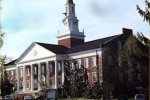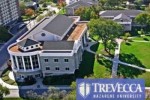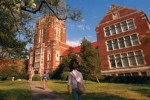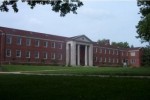Get Your Degree!
Known to many as the Volunteer State, Tennessee is the 16th largest state by population with around seven million residents. The state is situated between Georgia, Mississippi, Alabama, North Carolina, Missouri, and Arkansas. Tennessee is home to over 200 accredited higher education institutions from Knoxville to Martin. Public universities in the state are highly regarded, well-known institutions of higher learning. Top ranked public colleges in Tennessee include Austin Peay State University, University of Tennessee, University of Memphis, East Tennessee State University, Tennessee State University, and Middle Tennessee State University. Large state colleges can quickly be assimilated into a list, dissected, ranked, and sorted using our exclusive matching tools. More importantly, you can utilize your profile and academic preferences to find universities that fit your academic objectives and vocational goals. Take the time to research Tennessee state universities, request information from top colleges, and narrow you list to a handful of schools that meet your needs. Get motivated, stay organized, and strive to be the best you can be though higher education.
2025 Best Public Colleges in Tennessee
The University of Tennessee (UT) is considered a "research-intensive" institution of higher learning that promotes excellent education, research and public service. The university co-manages the Oak Ridge National Laboratory, the Department of Energy's largest science and Energy lab.
UT was ranked 47th among public universities in the United States by U.S. News and World Report. The University of Tennessee's nuclear engineering, social work, and supply chain management and logistics programs rank particularly high.
UT offers more than 300 academic degree programs at the bachelor's, master's and doctoral levels. It is situation on a large, 560-acre campus that is known for its green spaces, nearby lakes and views of the Great Smoky Mountains National Park.
The UT brings many research dollars to the state of Tennessee and prides itself on sharing the collective expertise, creativity and cutting-edge research of its faculty and student body with the local communities.
History
The University of Tennessee was founded in Knoxville in 1794 as Blount College, two years before Tennessee became a state. The school changed names a few times, becoming the University of Tennessee in 1879. Initially an all-male college, the first women were admitted as students in 1892. The university had to close during the Civil War, and its buildings were used by the Confederate army, and later the Union army. It reopened after the war, becoming a federal land-grant institution. The UT has continued to grow since then, expanding its program offerings through the years.
Traditions
The University of Tennessee is rich with traditions, and the two most notable traditions are worth mentioning. The school colors of orange and white, chosen for the orange and white daisies that grew on campus. Part of the original campus is known as "The Hill," the rising bank above the north short of the Tennessee River, on which Ayres Hall stands. Ayres Hall was built in 1919.
Academics
The University of Tennessee's academic calendar follows the semester format, with fall, spring and summers semesters, and a shorter "mini-term" that runs from early May until early June.
Colleges and Schools
- Agricultural Sciences and Natural Resources
- Architecture and Design
- Arts and Sciences
- Business Administration
- Communication and Information
- Education, Health, and Human Sciences
- Engineering
- Graduate School
- Law
- Nursing
- Social Work
- Space Institute
- Veterinary Medicine
The University of Tennessee also has institutes of Agriculture, Public Service and Space.
Student Life
The University of Tennessee offers many programs and resources to its students, including undergraduate advising, outreach and continuing education, honors programs, distinguished fellowship programs, a student success center, a teaching and learning center, and more.
The UT Knoxville campus offers 12 residential housing options for students. There are also many dining options on campus.
Students at UT have more than 300 student clubs and organizations to choose from, including service groups, academic clubs, and professional organizations, those focused on politics, religion, sports or other interests.
Fraternities and Sororities
There are more than 26 fraternities and 17 sororities available at the University of Tennessee. The Dean of Students Office has more information about how to become involved.
Athletics
The UT athletics division has 20 men's and women's varsity teams that compete in intercollegiate sports. The "Vols" and "Lady Vols" have won many athletics championships. The "Vols" sports teams include:
Men's Sports:
- Baseball
- Basketball
- Cross Country
- Football
- Golf
- Swimming & Diving
- Tennis
- Track and Field
Women's Sports:
- Basketball
- Cross Country
- Golf
- Rowing
- Soccer
- Softball
- Swimming & Diving
- Tennis
- Track & Field
- Volleyball
Satellite Campuses
The Knoxville campus is the flagship campus of the University of Tennessee system, which also includes the Chattanooga and Martin campuses, and the UT Health Science Center in Memphis.
Community Life
The University of Tennessee prides itself on being an economic driver in the state. Its co-management, with Battelle Memorial Institute, of the Oak Ridge National Laboratory is one of its key contributions to and collaborations with the local communities. Additionally, UT has a top campus environmental effort called "Make Orange Green" that is honored across the state.
Enrollment
28,894
Student to Faculty Ratio
17:1
Tennessee Technological University provides a variety of degree programs for students to guide them in their growth and development. The school is located in Cookeville, TN and publically funded. Around 12,000 students enroll at Tennessee Tech University yearly. A list of some of the more popular programs offered are:
- Education
- Business And Marketing Studies
- Health And Clinical Professions
- Engineering
- Biological And Biomedical Sciences
- Baseball (NCAA Division I-AA)
- Basketball (NCAA Division I-AA)
- Track & Field (NCAA Division I-AA)
- Football (NCAA Division I-AA)
Enrollment
10,186
Student to Faculty Ratio
18:1
University of Memphis ("U of Memphis") is a public research university located on a 1,607-acre campus in Memphis, Tennessee. In addition to its main park-like campus, the University of Memphis offers online learning via its eCampus, and onsite learning at several satellite campuses in the Memphis area.
The University of Memphis offers 17 bachelor's degrees in more than 200 areas of study. It offers degrees at the master's level in more than 50 subjects, and degrees at the doctoral level in more than 20 subjects. There are also specialist or professional degrees offered in education and law.
The University of Memphis ranks high according to the U.S. News and World Report for its undergraduate business program.
The University boasts a renowned faculty, including several highly awarded mathematicians, 26 Chairs of Excellence, a recipient of the first Presidential Award for Lifetime Achievement in Research, and a Carnegie Foundation Professor of the Year recipient, among others.
History
The University of Memphis was founded in 1912 as the West Tennessee State Normal School. In 1925, the school's name was changed to "West Tennessee State Teachers College." In 1935, the college's agricultural department was closed.
In 1941, the name changed again to "Memphis State College." Graduate programs were initiated in 1950.
In 1957, the college was granted full university status. In 1959, the first black students were admitted. Doctoral programs were initiated in 1966. In 1994, the name was changed again to "University of Memphis."
Academics
The academic calendar for the University of Memphis follows the semester system, with fall, spring and summer semesters.
Colleges and Schools
- Cecil C. Humphreys School of Law
- College of Arts & Sciences
- College of Communication and Fine Arts
- College of Education
- Fogelman College of Business and Economics
- Graduate School
- Herff College of Engineering
- Loewenberg School of Nursing
- School of Communication Sciences and Disorders
- School of Public Health
- University College
Tennessee Centers of Excellence
- Center for Applied Psychological Research (CAPR)
- Center for Earthquake Research and Information (CERI)
- Center for Research in Educational Policy (CREP)
- Center for Research Initiatives and Strategies for the Communicatively Impaired (CRISCI)
- Institute of Egyptian Art and Archaeology
Student Life
There are numerous student clubs and organizations available on the University of Memphis that cover a range of interest foci, including arts, culture, honor societies, politics, academics, professional, religious, service, sports and recreation, and special interest. Students may also begin their own club or organization.
Sororities and fraternities are active on the University of Memphis campus.
Living on campus is an option through various residence halls, and there are many "Tiger Dining" options.
Campus recreation offers many facilities and events for fitness and entertainment. Student health services are provided on campus.
The Office of Student Leadership and Involvement offers many programs and activities that allow students to become involved in campus life.
Traditions
The traditional school colors of the University of Memphis were originally blue and gray, but are now blue and white. The school mascot is the tiger, and the University of Memphis athletic teams are nicknamed the "Tigers."
The teams have been referred to as the "Tigers" since 1914, when during their final game the students shouted, "We fight like Tigers!" It later became the official nickname.
Athletics
The University of Memphis "Tigers" compete in several intercollegiate sports, including:
Men's Sports:
- Baseball
- Basketball
- Cross Country
- Football
- Golf
- Rifle
- Soccer
- Tennis
- Track and Field
- Volleyball
Women's Sports:
- Basketball
- Cross Country
- Golf
- Soccer
- Tennis
- Track and Field
- Volleyball
Satellite Campuses
In addition to its main campus in Memphis, and it online eCampus, the University also has satellite campuses in the following communities and neighborhoods:
- Collierville
- Cordova
- Germantown
- Millington
- Whitehaven
- Jackson
- Dyersburg
Community Life
The University of Memphis offers many non-credit and non-degree continuing education courses that are available to community members.
Enrollment
21,458
Student to Faculty Ratio
15:1
East Tennessee State University is a public institution that has a large selection of degrees available for students to choose from. The school is located in Johnson City, Tennessee, in a predominantly urban area. ETSU has an annual student enrollment of over 15,000. Here is a list of some of the popular programs ETSU offers:
- Health And Clinical Professions
- Business And Marketing Studies
- Education
- Liberal Arts And Sciences
- Psychology
- Biological And Biomedical Sciences
- Baseball (NCAA Division I-AAA)
- Basketball (NCAA Division I-AAA)
- Track & Field (NCAA Division I-AAA)
- Golf (NCAA Division I-AAA)
Enrollment
14,317
Student to Faculty Ratio
16:1
UTC, a public institution, offers a variety of degree programs, allowing students to choose which major is right for them. Located in Chattanooga, TN, the school offers an urban setting for students to study in. Over 11,000 students enroll at UTC yearly.
A list of some of the more popular programs offered are:
- Business And Marketing Studies
- Psychology
- Recreation And Fitness Studies
- Health And Clinical Professions
- Biological And Biomedical Sciences
Students applying for admission are asked to submit an application, transcripts, test scores and any requested letters of recommendations, which will then be reviewed by the admissions office. The majority of students admitted to UTC have an SAT score within the range of 940 - 1170, or an ACT score within the range of 21 - 25. 74% of those students that apply are admitted to The University of Tennessee at Chattanooga, of which 44 percent choose to attend. More information from the admissions office can be found here.
The tuition at The University of Tennessee at Chattanooga varies based on the state of residence of the student. In-state residents pay around $7,400 per year, while out-of-state residents are charged $22,000 for the year. Housing is available on-campus for students. The annual cost of housing is approximately $5,800. This school may provide financial aid for students that qualify as loans, grants, scholarships and work study programs.
Athletic programs are available at UTC through the NCAA, allowing students to compete in intercollegiate athletics. Athletic programs available:
- Basketball (NCAA Division I-AA)
- Track & Field (NCAA Division I-AA)
- Football (NCAA Division I-AA)
Students can visit the school's http://www.utc.edu to see additional information.
Enrollment
11,638
Student to Faculty Ratio
19:1
UT Martin is a public college that has a large number of degree programs available for students to choose from. The school is located in Martin, Tennessee, in a predominantly rural area. Enrollment at The University of Tennessee - Martin is nearly eight thousand yearly.
Students may choose from many areas of study, including but not limited to:
- Interdisciplinary Studies
- Education
- Recreation And Fitness Studies
- Agriculture Operations
- Biological And Biomedical Sciences
To be considered for admissions, applicants may be required to complete an application, write a personal statement, and submit school records, which are then reviewed by the admissions committee. The majority of students at UT Martin scored within the range of 20 to 24 on the ACT exam. 73% of those students that apply are admitted to The University of Tennessee - Martin, of which 51 percent choose to attend. More information from the admissions office can be found at utm.edu.
Tuition & fees at UT Martin are different for in-state and out-of-state residents. In-state tuition costs approximately $7,400 per year, while out-of-state tuition costing $21,000 for the year. The price of on-campus housing is about $2,900 for the year. Financial aid may be offered to students that meet the necessary requirements in the form of loans, grants, scholarships and work study programs.
Athletic programs are available at UT Martin through the NCAA, allowing students to participate in intercollegiate athletics. Athletic programs available may include:
- Baseball (NCAA Division I-AA)
- Basketball (NCAA Division I-AA)
- Football (NCAA Division I-AA)
- Golf (NCAA Division I-AA)
Students may visit The University of Tennessee - Martin website to obtain a complete list of academic programs offered, admissions information, and more that is available at this school.
Enrollment
7,048
Student to Faculty Ratio
15:1
Middle Tennessee State University (MTSU) is a public research university located in Murfreesboro, Tennessee. It offers a variety of nationally recognized degree programs at the bachelor's, master's, and doctoral levels. MTSU offers many interdisciplinary minors and majors.
MTSU is a first choice for numerous undergraduates from within the state of Tennessee, and beyond. It has many prestigious programs, including the Buchanan Fellowships awarded to talented students enrolled in the MTSU Honors College. Among the highest quality graduate-level programs at MTSU are the English, Economics, Human Performance and Public History programs. The aerospace, recording industry and concrete management programs also receive high marks. The Center for Popular Music at MTSU is a top destination for many visitors who want to see its renowned sheet music collection. MTSU's College of Liberal Arts sponsors top national programs in Debate, Mock Trial and Model United Nations.
Perhaps the most famous alumnus of MTSU was U.S. Senator Albert Gore, Sr., the father of former Vice President Al Gore, Jr. The Albert Gore Research Center at MTSU was named after Gore Sr. donated his papers to the university. The center is a repository for manuscripts and materials of value to the history of Middle Tennessee. Al Gore, Jr., has served as a visiting professor at MTSU.
History
MTSU was founded in 1911 as "Middle Tennessee State Normal School." It was one of three state normal schools established for teacher training. Middle Tennessee State University is now the oldest and largest public university in Middle Tennessee. MTSU expanded from a two-year training school to a four-year college in 1925. In 1943 it became a state college. The graduate school was established in 1951, and began granting master's degrees. The college's name became "Middle Tennessee State University" in 1965. The doctoral degree programs were added in the 1970s. In the 1990s, the university's six schools, and its Honors Program, became colleges.
MTSU has graduated more than 90,000 students since it was founded in 1911.
Academics
The academic calendar for Middle Tennessee State University follows the semester format, with fall and spring semesters, and several short summer "terms."
Colleges and Schools
Middle Tennessee State University (MTSU) has nine academic colleges, and several centers and institutes, as well as numerous academic departments.
Colleges
- Basic and Applied Sciences
- Behavioral and Health Sciences
- Business
- Education
- Graduate Studies
- University College
- Liberal Arts
- Mass Communication
- University Honors
Centers and Institutes
- Undergraduate Research Center
- Center for Advancement of Research and Scholarship
- MTSU Interdisciplinary Microanalysis and Imaging Center
- TN Center for Child Welfare
Other Centers
- The Albert Gore Research Center
- TN Math, Science and Technology Education Center TMSTEC
- Center for Environmental Education
- Center for Cedar Glade Studies
- Biotechnology Resource Group
- Center for Study and Treatment of Dyslexia
- Center for Health and Human Services
- Center for Popular Music
- Center for Historic Preservation
- Business and Economic Research Center
- Tennessee Center for Labor Management Relations
- Tennessee Small Business Center
- Instructional Technology Support Center
- Center for Economic Education
- Center for Energy Efficiency
- Child Development Center
- Learning, Teaching, and Innovative Technologies Center
Student Life
An active student life is encouraged at MTSU, with more than 200 student organizations available on campus. Everything from honor societies, to intramural sports and spirit teams, or service and leadership clubs are represented. There are local chapters of fraternities and sororities at MTSU, and there is an active Greek Life on campus.
Student resources are plentiful, and include academic advising, computer labs, student-athlete enhancement, testing services, support services, a university writing center, a library, child care services, student health services, student government, a bookstore, and more.
On campus living is available at MTSU. More than 3,500 students and their families live in the 21 residence halls and apartments on the MTSU campus. Each living area is unique, with professional staff and student leaders living and working in each area to coordinate services and programs. Some of the many amenities and programs available to on-campus residents include computer facilities, student leadership training, recreational activities, academic support services, and more.
Traditions
The school colors for Middle Tennessee State University are blue and white, and the teams are called the "Blue Raiders." The school mascot is a winged horse named "Lightning."
Athletics
The "Blue Raiders" athletic teams of Middle Tennessee State University compete in many intercollegiate sports, including:
Men's Sports:
- Baseball
- Basketball
- Cross Country
- Football
- Golf
- Tennis
- Track and Field
Women's Sports:
- Basketball
- Cross Country
- Golf
- Soccer
- Softball
- Tennis
- Track and Field
- Volleyball
Community Life
Many of the sports, arts and entertainment events and activities on the MTSU campus are open to community members. Community organizations and businesses may hire an expert speaker from MTSU, and Continuing Education classes are offered to community members.
Enrollment
21,631
Student to Faculty Ratio
17:1
APSU is a public institution that has a fair number of majors and degree programs available for students to choose from. The school is located in Clarksville, TN, in a predominantly urban area. Over eleven thousand students enroll at Austin Peay State University per year.
Here is a list of some of the popular programs APSU offers:
- Business And Marketing Studies
- Liberal Arts And Sciences
- Health And Clinical Professions
- Communications And Journalism
Students applying for admission are most often asked to submit an application, transcripts, records, standardized test scores and any requested letters of recommendations, which will then be reviewed by admissions staff. An ACT or SAT exam is required prior to applying, with scores within the range of 840 - 1080 on the SAT and between 19 - 23 on the ACT is typical among students admitted to Austin Peay State University. 88% of students that apply are accepted to this school, of which 57% choose to enroll. More information regarding admissions can be found at apsu.edu.
Tuition & fees at this school vary for in-state and out-of-state residents. In-state tuition costs approximately $7,100 per year with out-of-state tuition costing $22,000 annually. Housing is available for students, and generally costs approximately $4,800 for the year. Financial aid may be provided to students that meet the required requirements by way of grants or student loans.
The mascot for Austin Peay State University is the "Governors", and they participate in intercollegiate athletic programs through the NCAA. Sports available:
- Baseball (NCAA Division I-AA)
- Basketball (NCAA Division I-AA)
- Track & Field (NCAA Division I-AA)
- Football (NCAA Division I-AA)
- Golf (NCAA Division I-AA)
Students who would like to learn more about this school can visit their website at http://www.apsu.edu.
Enrollment
10,954
Student to Faculty Ratio
18:1
History
Tennessee State University first welcomed students in 1912. At that time it was known as Tennessee Agricultural and Industrial Normal School. By 1922, the school had become a college and in 1951, its status escalated to university. Tennessee State University is located in Nashville, Tennessee.
Academics
Tennessee State University is made up of several different colleges and schools, which offer a wide variety of choices. Forty different bachelor degrees can be obtained. Examples include, but are not limited, to the following:
- Nursing
- Consumer Sciences
- Dental Hygiene
- Agricultural Sciences
- African Studies
- Music Education
- Hospitality and Tourism
- Aeronautical and Industrial Technology
- Criminal Justice
- Biology
Tennessee State University offers Master's degrees in many fields. Examples include, but are not limited to, the following:
- Mathematical Sciences
- Public Administration
- Computer Information System Engineer
- Chemistry
There are some departments that offer courses only on a graduate level.
Student Life
There are eleven student organizations at Tennessee State University. Examples include:
- Alpha Kappa Alpha sorority
- Fellowship Christian Athletics
- Alpha Phi Alpha fraternity.
There is a performing arts center and an amphitheatre on campus as well as the Tennessee State University Library, which includes a smart classroom.
Unique Programs
The Aerospace studies program offers the Air Force ROTC program. These programs teach and prepare students to be aerospace experts.
Community
Nashville has much to offer Tennessee State University students. Be sure to take in a performance at the Tennessee Performing Arts Center. If you are a country music fan, the Grand Ol' Opry and the Country Music Hall of Fame are must-sees. Loretta Lynn's Ranch is approximately a one-hour drive from campus. It's a great place to camp with picturesque scenery, sparkling clear water, trail rides, a museum and shopping.
Other venues include a cruise on the river aboard the General Jackson Showboat, or if you enjoy gardening, the Cheekwood Botanical Garden is beautiful. For those who love animals, the Nashville Zoo is a perfect place to get away or visit Bicentennial Capitol Mall State Park where you can hike or take in a special event. Whatever your tastes, there is something for you in and around Nashville.
Enrollment
7,774
Student to Faculty Ratio
12:1
Degree Programs at Tennessee Public Universities

The size and quality of the state universities in Tennessee provide students with the ability to study a multitude of areas of concentration. Serving over 100,000 students each year, the public colleges in the state have the resources and faculty to support a growing student body. Undergraduate and graduate degrees can be found from each institution in a variety of disciplines. Students can follow a more traditional path and studyfinance,biology,math,engineering, andteachingor specialty degree tracks. Specialty programs may include degree programs inactuarial science,bioinformatics,computational mathematics,petroleum engineering, orEnglish as a second language.
-2
The 4 schools listed below are part of the -2 system. By following the links below, you can view each school's profile in detail.
Baptist Memorial College of Health Sciences in Clarksville, TN

Visit the website for Baptist Memorial College of Health Sciences at http://www.bchs.edu
Program Details
- 10,000 to 19,999 Undergraduate Students Enrolled
- Tuition & fees $13,000 per year
Chattanooga College Medical Dental and Technical Careers in Johnson City, TN

Visit the website for Chattanooga College Medical Dental and Technical Careers at http://www.chattanoogacollege.edu
Program Details
- 10,000 to 19,999 Undergraduate Students Enrolled
- Tuition & fees $11,000 per year
Tennessee Technological University in Nashville, TN

Visit the website for Tennessee Technological University at http://www.tntech.edu
Program Details
- 5,000 to 9,999 Undergraduate Students Enrolled
- Tuition & fees $9,000 per year for state residents ($26,000 Nonresidents)
Trevecca Nazarene University (Tennessee Tech University) in Cookeville, TN

Visit the website for Trevecca Nazarene University at http://www.trevecca.edu
Program Details
- 10,000 to 19,999 Undergraduate Students Enrolled
- Tuition & fees $27,000 per year
The University of Tennessee System
The 2 schools listed below are part of The University of Tennessee System. By following the links below, you can view each school's profile in detail.
The University of Tennessee (UTC) in Chattanooga, TN

Visit the website for The University of Tennessee at http://www.utk.edu
Program Details
- 10,000 to 19,999 Undergraduate Students Enrolled
- Tuition & fees $14,000 per year for state residents ($33,000 Nonresidents)
The University of Tennessee - Martin (UT Martin) in Knoxville, TN

Visit the website for The University of Tennessee - Martin at http://www.utm.edu
Program Details
- More Than 20,000 Undergraduate Students Enrolled
- Tuition & fees $10,000 per year for state residents ($17,000 Nonresidents)
Notes: Tuition & fee amounts are for both Tennessee in-state residents and out of state students, unless noted otherwise. The tuition information displayed is an estimate, which we calculated based on historical data and should be solely used for informational purposes only. Please contact the respective school for information about the current school year.
Source: IPEDS Survey 2012-2020: Data obtained from the US Dept. of Education's Integrated Postsecondary Education Data System (IPEDS). Data may vary depending on school and academic year.